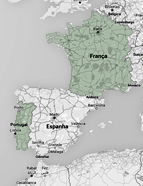

The founding members were aware of the danger that their backgrounds and political affinities represented for the SPHC's legalization. As already seen, the strategy not only involved inviting prestigious personalities known for their collaboration with research and teaching institutions under the tutelage of the Estado Novo, but also the IFP and Société Marc Bloch's intervention in the Civil Government. Nevertheless, this was a risky strategy with unpredictable results. As mentioned by António José Saraiva to Borges de Macedo in March 1947, dependence on a foreign partnership (and even more so on post-war France) did not necessarily guarantee that the legalization of the SPHC would be facilitated, and this concern was also shared by Armando Castro. In the statutes sent to the Civil Government, a cautious and ambiguous stance was adopted which, while not omitting the connection to the French Société Marc Bloch (Art. 4), stated that the SPHC would be affiliated to the Associação Portuguesa para o Progresso das Ciências [Portuguese Association for the Progress of Sciences] (Art. 5), the institution responsible for organising the periodical Luso-Spanish colloquia of that name. However, on the basis of the existing documentation, it is not possible to ascertain the role of the IFP and the Société Marc Bloch in favour of legalizing the SPHC. A letter from Armando Castro to Borges de Macedo in April 1948, suggesting that the Société Marc Bloch be informed of the SPHC's legal and financial situation, appears to suggest that the latter was not aware of these difficulties or that it recognised its inability to intercede with the Portuguese authorities and help it financially.
In addition to the legalization and aforementioned financial difficulties, which led to a campaign to attract members from all over the country, the SPHC's survival was also undermined by other problems, such as the geographical dispersion of its members (Madeira, "Os novos remexedores da história" [The new agitators of history], 2007, p. 321). According to Armando Castro in a letter to Borges de Macedo dated October 5, 1947, a project seeking to be interdisciplinary and based on teamwork required frequent meetings of its members. The few meetings held attested to these difficulties.
The project's advocate was in Paris and a significant number of the founding members were scattered across Lisbon, Coimbra, Porto and abroad. By comparison, this problem had already been raised upon the creation of the Portuguese Academy of History, and it had been recommended that the tenured academics should reside in Lisbon, precisely to ensure the regular functioning of the institution (Torgal, “A história em tempo de ditadura” [History in times of dictatorship], 1996, p. 254).
